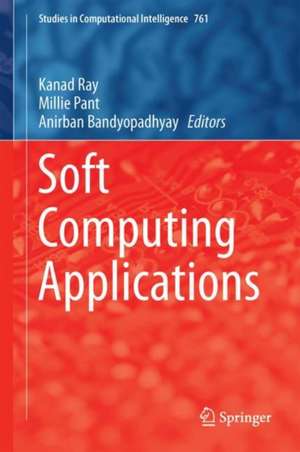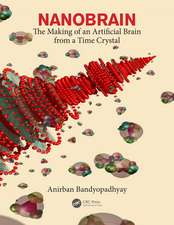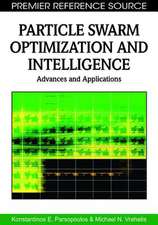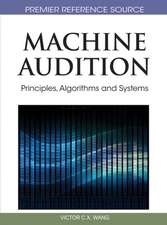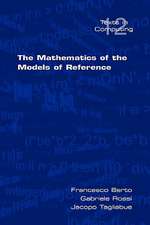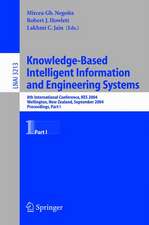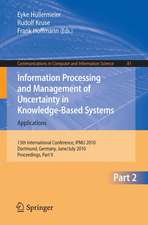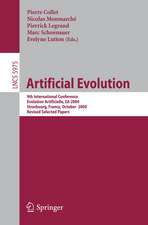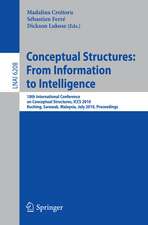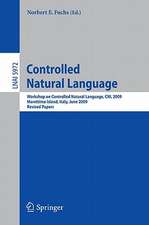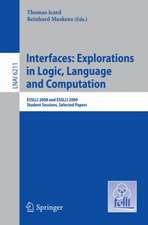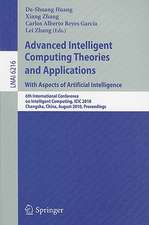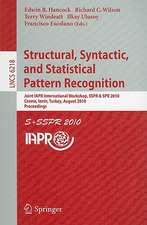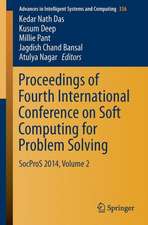Soft Computing Applications: Studies in Computational Intelligence, cartea 761
Editat de Kanad Ray, Millie Pant, Anirban Bandyopadhyayen Limba Engleză Hardback – 17 apr 2018
The term soft computing represents an umbrella term for computational techniques like fuzzy logic, neural networks and nature inspired algorithms. In the past few decades, there has been an exponential rise in the application of soft computing techniques to address complex and intricate problems in diverse spheres of life. The versatility of these techniques has made them a favourite among scientists and researchers alike.
| Toate formatele și edițiile | Preț | Express |
|---|---|---|
| Paperback (1) | 639.52 lei 6-8 săpt. | |
| Springer Nature Singapore – 25 ian 2019 | 639.52 lei 6-8 săpt. | |
| Hardback (1) | 260.21 lei 3-5 săpt. | +20.11 lei 4-10 zile |
| Springer Nature Singapore – 17 apr 2018 | 260.21 lei 3-5 săpt. | +20.11 lei 4-10 zile |
Din seria Studies in Computational Intelligence
- 20%
 Preț: 449.37 lei
Preț: 449.37 lei - 20%
 Preț: 1158.26 lei
Preț: 1158.26 lei - 20%
 Preț: 986.66 lei
Preț: 986.66 lei - 20%
 Preț: 1452.76 lei
Preț: 1452.76 lei - 20%
 Preț: 168.78 lei
Preț: 168.78 lei - 20%
 Preț: 1291.10 lei
Preț: 1291.10 lei - 18%
 Preț: 1112.30 lei
Preț: 1112.30 lei - 20%
 Preț: 565.39 lei
Preț: 565.39 lei - 20%
 Preț: 649.28 lei
Preț: 649.28 lei - 20%
 Preț: 1047.73 lei
Preț: 1047.73 lei - 20%
 Preț: 1578.96 lei
Preț: 1578.96 lei - 20%
 Preț: 643.50 lei
Preț: 643.50 lei - 20%
 Preț: 657.49 lei
Preț: 657.49 lei - 20%
 Preț: 993.28 lei
Preț: 993.28 lei - 20%
 Preț: 990.80 lei
Preț: 990.80 lei - 20%
 Preț: 989.96 lei
Preț: 989.96 lei - 20%
 Preț: 1165.69 lei
Preț: 1165.69 lei - 20%
 Preț: 1444.52 lei
Preț: 1444.52 lei - 20%
 Preț: 1041.96 lei
Preț: 1041.96 lei - 20%
 Preț: 1047.73 lei
Preț: 1047.73 lei - 20%
 Preț: 1046.06 lei
Preț: 1046.06 lei - 18%
 Preț: 2500.50 lei
Preț: 2500.50 lei - 20%
 Preț: 989.13 lei
Preț: 989.13 lei - 20%
 Preț: 1165.69 lei
Preț: 1165.69 lei - 20%
 Preț: 1164.05 lei
Preț: 1164.05 lei - 20%
 Preț: 1042.79 lei
Preț: 1042.79 lei - 20%
 Preț: 1460.19 lei
Preț: 1460.19 lei - 18%
 Preț: 1403.52 lei
Preț: 1403.52 lei - 18%
 Preț: 1124.92 lei
Preț: 1124.92 lei - 20%
 Preț: 1039.47 lei
Preț: 1039.47 lei - 20%
 Preț: 1008.11 lei
Preț: 1008.11 lei - 20%
 Preț: 1045.25 lei
Preț: 1045.25 lei - 20%
 Preț: 1275.42 lei
Preț: 1275.42 lei - 20%
 Preț: 1040.32 lei
Preț: 1040.32 lei - 20%
 Preț: 988.32 lei
Preț: 988.32 lei - 20%
 Preț: 1169.79 lei
Preț: 1169.79 lei - 20%
 Preț: 1162.37 lei
Preț: 1162.37 lei - 20%
 Preț: 1059.26 lei
Preț: 1059.26 lei - 20%
 Preț: 1164.05 lei
Preț: 1164.05 lei - 20%
 Preț: 1166.52 lei
Preț: 1166.52 lei - 20%
 Preț: 1459.38 lei
Preț: 1459.38 lei - 18%
 Preț: 1005.74 lei
Preț: 1005.74 lei - 20%
 Preț: 997.38 lei
Preț: 997.38 lei - 20%
 Preț: 1055.94 lei
Preț: 1055.94 lei - 20%
 Preț: 1284.47 lei
Preț: 1284.47 lei - 20%
 Preț: 994.08 lei
Preț: 994.08 lei - 20%
 Preț: 1048.72 lei
Preț: 1048.72 lei - 20%
 Preț: 1066.02 lei
Preț: 1066.02 lei - 20%
 Preț: 943.78 lei
Preț: 943.78 lei - 20%
 Preț: 1173.10 lei
Preț: 1173.10 lei
Preț: 260.21 lei
Preț vechi: 325.26 lei
-20% Nou
Puncte Express: 390
Preț estimativ în valută:
49.81€ • 54.12$ • 41.86£
49.81€ • 54.12$ • 41.86£
Carte disponibilă
Livrare economică 01-15 aprilie
Livrare express 15-21 martie pentru 30.10 lei
Preluare comenzi: 021 569.72.76
Specificații
ISBN-13: 9789811080487
ISBN-10: 9811080488
Pagini: 155
Ilustrații: X, 165 p. 68 illus., 43 illus. in color.
Dimensiuni: 155 x 235 x 12 mm
Greutate: 0.43 kg
Ediția:1st ed. 2018
Editura: Springer Nature Singapore
Colecția Springer
Seria Studies in Computational Intelligence
Locul publicării:Singapore, Singapore
ISBN-10: 9811080488
Pagini: 155
Ilustrații: X, 165 p. 68 illus., 43 illus. in color.
Dimensiuni: 155 x 235 x 12 mm
Greutate: 0.43 kg
Ediția:1st ed. 2018
Editura: Springer Nature Singapore
Colecția Springer
Seria Studies in Computational Intelligence
Locul publicării:Singapore, Singapore
Cuprins
A Brain like Computer Made of Time crystal: Could a Metric of Prime alone Replace a User and Alleviate Programming Forever?.- Optimum Selection of Energy-Efficient Material: A MCDM Based Distance Approach.- Role of Sodium, Potassium and Synaptic Conductance in STN-GPe Model of Basal Ganglia in Parkinson Disease.- A New Hybrid Algorithm Using Chaos Enhanced Differential Evolution For Loss Minimization With Improvement of Voltage Profile of Distribution Systems.- Fractal and Periodical Biological Antennas: Hidden Topologies in DNA, Wasps and Retina in the Eye.- Efficient Multiprocessor Scheduling Using Water Cycle Algorithm.- Estimating Software Reliability Growth Model Parameters Using Opposition Based Shuffled Frog-Leaping Algorithm.
Notă biografică
Kanad Ray is a Professor of Physics at Amity School of Applied Sciences Physics Amity University Rajasthan (AUR), Jaipur. In an academic career spanning over 19 years, he has published and presented research papers in several national and international journals and at conferences in India and abroad. He has authored a book on the Electromagnetic Field Theory. Dr. Ray’s current research interests include Cognition, Communication, Electromagnetic Field Theory, Antenna & Wave Propagation, Microwaves, Computational Biology and Applied Physics.
Millie Pant is an Associate Professor at the Department of Paper Technology, Indian Institute of Technology Roorkee (IIT Roorkee), India. A well-known figure in the field of swarm intelligence and evolutionary algorithms, she has published several research papers in respected national and international journals.
Anirban Bandyopadhyay is a Senior Scientist in the National Institute for Materials Science (NIMS), Tsukuba, Japan. He did his PhD (supramolecular electronics) from Indian Association for the Cultivation of Science (IACS), Kolkata in 2005. During 2005-2008, he got selected as Independent Researcher, ICYS Research Fellow in the International Center for Young Scientists (ICYS), NIMS, Japan while working on brain-like bio-processor building. In 2007, he started as permanent Scientist in NIMS, working on cavity resonator model of human brain & brain-like organic jelly. During 2013-2014, he was a visiting professor in MIT, USA. He got Hitachi Science and Technology award in 2010, Inamori Foundation award in 2011-2012, Kurata Foundation Award, Inamori Foundation Fellow (2011) & Sewa Society International member, Japan etc.
Millie Pant is an Associate Professor at the Department of Paper Technology, Indian Institute of Technology Roorkee (IIT Roorkee), India. A well-known figure in the field of swarm intelligence and evolutionary algorithms, she has published several research papers in respected national and international journals.
Anirban Bandyopadhyay is a Senior Scientist in the National Institute for Materials Science (NIMS), Tsukuba, Japan. He did his PhD (supramolecular electronics) from Indian Association for the Cultivation of Science (IACS), Kolkata in 2005. During 2005-2008, he got selected as Independent Researcher, ICYS Research Fellow in the International Center for Young Scientists (ICYS), NIMS, Japan while working on brain-like bio-processor building. In 2007, he started as permanent Scientist in NIMS, working on cavity resonator model of human brain & brain-like organic jelly. During 2013-2014, he was a visiting professor in MIT, USA. He got Hitachi Science and Technology award in 2010, Inamori Foundation award in 2011-2012, Kurata Foundation Award, Inamori Foundation Fellow (2011) & Sewa Society International member, Japan etc.
Textul de pe ultima copertă
This book provides a reference guide for researchers, scientists and industrialists working in the area of soft computing, and highlights the latest advances in and applications of soft computing techniques in multidisciplinary areas. Gathering papers presented at the International Conference on Soft Computing: Theories and Applications (SoCTA 2016), which was held in Jaipur, Rajasthan, India, on December 28–30, 2016, it focuses on applying soft computing to solve real-life problems arising in various domains, from medical and healthcare to supply chain management, image processing and cryptanalysis.
The term soft computing represents an umbrella term for computational techniques like fuzzy logic, neural networks and nature inspired algorithms. In the past few decades, there has been an exponential rise in the application of soft computing techniques to address complex and intricate problems in diverse spheres of life. The versatility of these techniques has made them a favourite among scientists and researchers alike.
The term soft computing represents an umbrella term for computational techniques like fuzzy logic, neural networks and nature inspired algorithms. In the past few decades, there has been an exponential rise in the application of soft computing techniques to address complex and intricate problems in diverse spheres of life. The versatility of these techniques has made them a favourite among scientists and researchers alike.
Caracteristici
Includes papers presented at the International Conference on Soft Computing: Theories and Applications (SoCTA 2016), which was held in Jaipur, Rajasthan, India, on December 28–30, 2016 Focuses on theories and analysis of soft computing techniques Helps to improve the understanding of soft computing at both the teaching and research level Inspires more and more researchers to work in the field of soft computing
